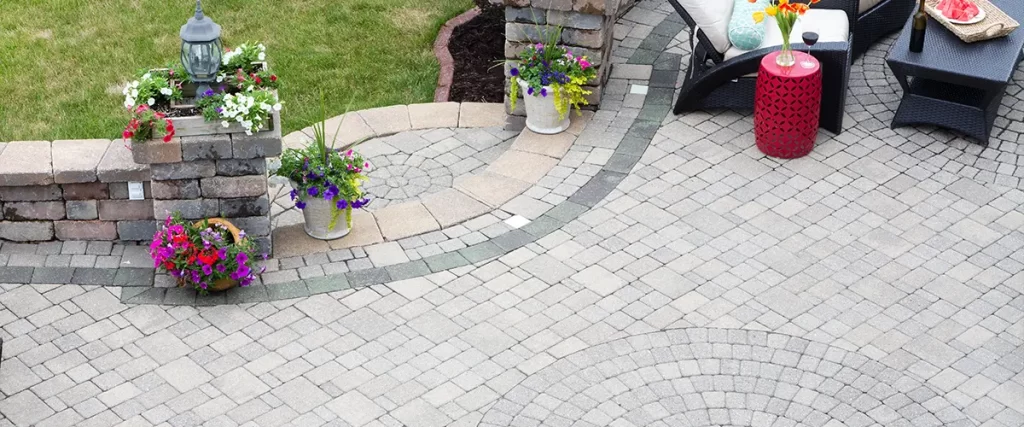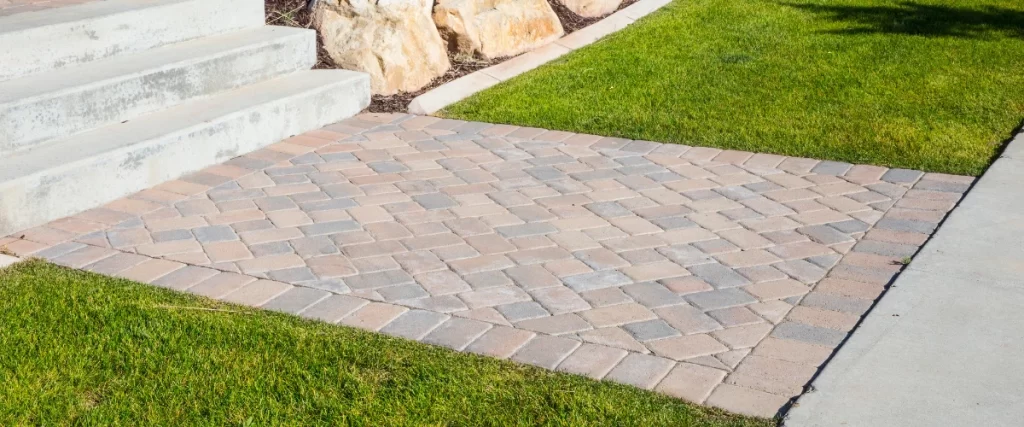Living in Denver means embracing the beauty of the Rockies, but it also means dealing with a unique set of challenges when it comes to outdoor living spaces. The city’s high altitude, freeze-thaw cycles, and intense UV exposure can wreak havoc on traditional patio materials.
If you’re a homeowner looking to design a paver patio that not only enhances your outdoor space but also stands the test of time, you’re in the right place.
In this comprehensive guide, we’ll delve into the best materials suited for Denver’s climate, discuss design considerations, and provide tips to ensure your patio remains beautiful and functional year-round.

Understanding Denver’s Unique Climate Challenges
Denver’s climate is characterized by:
- High Altitude: At over 5,000 feet above sea level, UV radiation is more intense, which can fade and degrade certain materials faster.
- Freeze-Thaw Cycles: Frequent temperature fluctuations, especially in spring and fall, can cause materials to expand and contract, leading to cracks and structural issues.
- Low Humidity: Dry air can cause some materials to become brittle over time.
These factors necessitate the selection of materials and designs that can withstand these conditions.
Top Paver Materials for Denver’s Climate
1. Concrete Pavers
Concrete pavers are a popular choice due to their durability and versatility. When properly sealed, they resist moisture penetration, reducing the risk of freeze-thaw damage. Additionally, they come in various colors and styles, allowing for customization to match your home’s aesthetic.
2. Porcelain Pavers
Porcelain pavers are non-porous, making them highly resistant to moisture absorption. This quality makes them less susceptible to freeze-thaw cycles. They also offer a sleek, modern look and are resistant to UV fading.
3. Natural Stone
Materials like granite, slate, and bluestone are naturally durable and can handle Denver’s climate well. However, it’s essential to choose stones with low water absorption rates and ensure proper sealing to prevent moisture-related issues.
4. Clay Brick Pavers
Clay bricks offer a classic look and are known for their strength. They’re less porous than concrete, reducing the risk of moisture-related damage. However, they can be more expensive and may require more maintenance over time.
Design Considerations for Longevity
Proper Base Installation
A well-prepared base is crucial. This includes:
- Excavation: Removing the topsoil to a depth suitable for your chosen paver and base materials.
- Base Layer: Using a compacted layer of crushed stone or gravel to provide stability and drainage.
- Sand Layer: A layer of sand helps to level the pavers and allows for minor adjustments during installation.
Drainage Solutions
Ensuring proper drainage prevents water from pooling on or under your patio, reducing the risk of freeze-thaw damage. Consider incorporating:
- Slope: Designing the patio with a slight slope away from your home.
- Permeable Pavers: These allow water to seep through, reducing runoff and promoting groundwater recharge.
Sealing and Maintenance
Regularly sealing your pavers can protect against moisture penetration, UV damage, and staining. Additionally, periodic maintenance, such as cleaning and re-sanding joints, will extend the life of your patio.
Best Paver Manufacturers for Denver’s Climate
When selecting pavers, it’s essential to choose products from reputable manufacturers known for quality and durability.
Belgard
Offers a wide range of paver styles and is known for its durable products that withstand harsh climates.
Borgert
Known for their high-strength concrete pavers that resist cracking and shifting.
Keystone Hardscapes
Provides innovative designs and durable materials suitable for various applications.
Pavestone
Offers a variety of styles and colors, with products designed to handle freeze-thaw conditions.
Unilock
Known for their advanced manufacturing techniques, producing pavers with high compressive strength and low water absorption.

Frequently Asked Questions
How often should I seal my paver patio?
It’s recommended to seal your patio every 2-3 years, depending on the material and exposure to elements.
Can I install a paver patio myself?
While DIY installation is possible, professional installation ensures proper base preparation and longevity, especially given Denver’s challenging climate.
Are there eco-friendly paver options?
Yes, permeable pavers are environmentally friendly, allowing water to pass through and reducing runoff.
Final Thoughts
Designing a paver patio in Denver requires careful consideration of materials and construction techniques to withstand the city’s unique climate challenges. By choosing the right materials, ensuring proper installation, and committing to regular maintenance, you can enjoy a beautiful, durable outdoor space for years to come.
If you’re ready to transform your outdoor space with a paver patio designed for Denver’s climate, contact us at (720) 580-3677. Our team is here to help you every step of the way.
